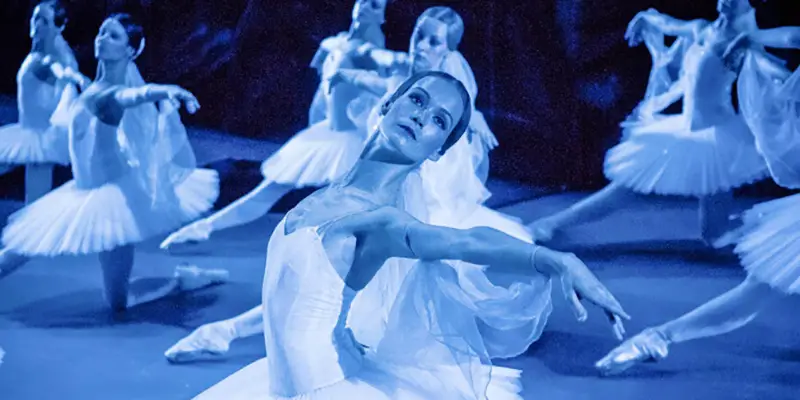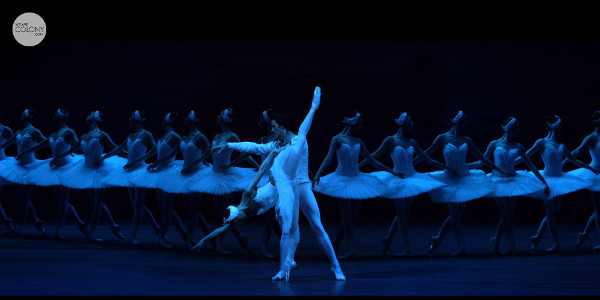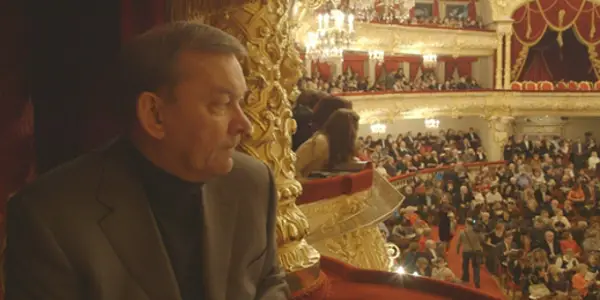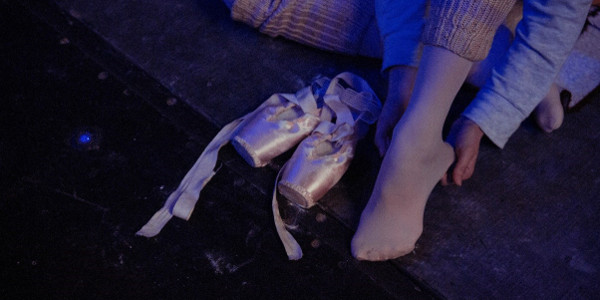BOLSHOI BABYLON: The Ballet Industry is Brutal

Rachel is an MA Film and Screen graduate from Goldsmiths,…
Back in 2013, a prestigious ballet director from the Bolshoi Theater named Sergei Filin was attacked outside his house, and acid was thrown into his face. He suffered third degree burns all over his face and down his neck and was left blind in one eye.
After an investigation, it was discovered that a dancer of the Bolshoi paid the perpetrator; the motive was in reference to the casting of Swan Lake in which Filin was responsible. From a form of dance that represents romance and majesty comes a terrifying act of cruelty, and Bolshoi Babylon explores how this brutal scandal affected the reputation, performers and management of one of the world’s most renowned ballet theaters.
Trouble in Paradise
Bolshoi Babylon primarily focuses on the theater as an institution and what it represents. Directors Nick Read and Mark Franchetti film almost entirely inside the Bolshoi, including within the dressing rooms and offices, while capturing some beautiful on-stage performances with fantastic cinematography. The film follows several ballerinas and managers expressing their roles and feelings towards the Bolshoi.
The film is a truly insightful documentary into the world of the Bolshoi during a time of high tension, and both directors have captured a chapter of the Bolshoi’s history. It’s far from an exposé on the theater scandals, but instead an observational view upon how the Bolshoi is run and its effects upon the people working there. It’s a portrait of a world famous institution and its complex systems.

With a long history of international praise and world famous for its ballet talent, the Bolshoi is seen as a Russian national gem. Bolshoi Babylon captures some magical moments of ballet, with the dancers leaping and pirouetting about the stage. Some dance sequences are even slowed down so that an untrained eye can truly see the beauty in the detail.
A striking dance sequence is the opening shot of the film: the ballerinas are bathed in blue light like floating ghosts, and are so in-sync with each other that they look like mirror images of one person. The precision and talent is quite obvious; the art of Russian ballet is seen as sacred and a place of complete respect that brings the performers and country together in unity.
The Bolshoi has a close relationship with the country and its government, with the Kremlin having certain powers and influences over the theater. However, the devastating attack upon Filin revealed the conflicts and discord that lay within the theater between the performers and management. Rumours regarding casting, theater management and performance pressure pushed the Bolshoi’s reputation to the limit. There was an internal divide within the ballet community and also a change in public opinion.

Russia’s national treasure was quickly subjected to public rumor and the scandal tainted to Bolshoi’s reputation. Read and Franchetti therefore gained access to an intense and mesmerizing world. Bolshoi Babylon examines the highly sensitive internal conflicts of a cultural symbol.
Broken Glass in Pointe Shoes
The career of a ballerina is known for being relatively short, highly competitive and brutal on the body. Ballet documentaries have examined the intense lives of ballerinas in close detail. Bertrand Normand’s film Ballerina follows several Russian ballerinas at different stages of their career, and they all express the emotional and physical stress they experience by choosing to become a dancer. This pressure doesn’t begin when you become professional, as another ballet documentary First Position points out. That film follows six young ballet dancers (ranging from ten to sixteen in age) as they prepare for the Youth America Grand Prix. Both ballet documentaries show the immense discipline and pain that an individual dancer must endure.
But where these documentaries focus on the personal passions and body sculpting of ballet, Bolshoi Babylon takes a different perspective. When interviewing the ballerinas, they all comment upon their struggles in the theater and how much hard work they endure. Yet the most surprising aspect about their interviews is the pressure from the institution and its residents.
Dancers talk openly about the way that the Bolshoi is run, and discuss the conflicts between the ballet dancers and the managers. It’s clear that their careers not only rely on their own talent but whoever is running the institute. With rumors flying around of dancer hierarchies, sex and personal politics, saying that there is tension is an understatement. If dancers turn to management positions, it’s seen as a betrayal and they get needles in their clothes and glass in their ballet shoes.

Bolshoi Babylon reveals this unknown side to ballet; it’s a remarkable access to all areas of the theater. After nine months of treatment and surgery, the film captures the return of Sergei Filin into the theater and his attempt to regain his place and power. However, his struggles with Kremlin-placed director Vladmir Urin come to surface, with the documentary capturing their arguments and dislike towards one another. With Urin wanting to make the Bolshoi’s activities more ‘transparent’, the filmmakers have access to many people in high places at the theater.
A Reflection of Russia
Bolshoi Babylon captures the spirit that the Bolshoi holds. It is a theater that was for the rich and powerful that not only survived the collapse of the Soviet Union, but also gained prestige and respect for ballet outside Russia. It’s the endurance of the theater that make it a symbol of Russia. It’s interesting to see just how much the nation and Bolshoi are intertwined and the emphasis that interviewees put on the country and theater paralleling each other. One interviewee comments, “If there is chaos in the country, there is chaos in the theater”.
There is a complete faith and dedication to the Bolshoi in this film, and an immense sense of Russian pride almost edging on political. In a similar way that the sport documentary Red Army portrays Russian nationalism with a political agenda, Bolshoi Babylon also hints at the same attitude.
The Russian Prime Minister Dmitry Medvedev is interviewed, saying: “The Bolshoi is our secret weapon that we send now and then to the US, the UK, and other countries.” This emphasis upon the political side suggests that the ballerinas and employees of the Bolshoi are not only there to serve the theater and their artistic endeavors but also to serve the country and enforce the power that Russia has over this form of dance.
Art and Power
What first drew Read and Franchetti to the Bolshoi was the vicious acid attack against Sergei Filin, but Bolshoi Babylon goes beyond that. It reveals the conflicts for power and influence in this extraordinary institution. There is a duality in the world of ballet – an obsession with dance and also with power. In narrative film, Darren Aronofsky’s Black Swan would make a beautiful pas de duex with Bolshoi Babylon, a place that creates endless beauty but also hides greed and a want of control. Whatever the scandal, though, the show must go on, for ballet is an art for the young.
Are you a fan of ballet or dance films? Is there always an element of power in any form of art? Let us know in the comments below!
https://www.youtube.com/watch?v=_TK8uth06SQ
Does content like this matter to you?
Become a Member and support film journalism. Unlock access to all of Film Inquiry`s great articles. Join a community of like-minded readers who are passionate about cinema - get access to our private members Network, give back to independent filmmakers, and more.
Rachel is an MA Film and Screen graduate from Goldsmiths, University of London. Her interests lie in cinematic landscapes, interactive media, documentary film and general screen stuffs.













